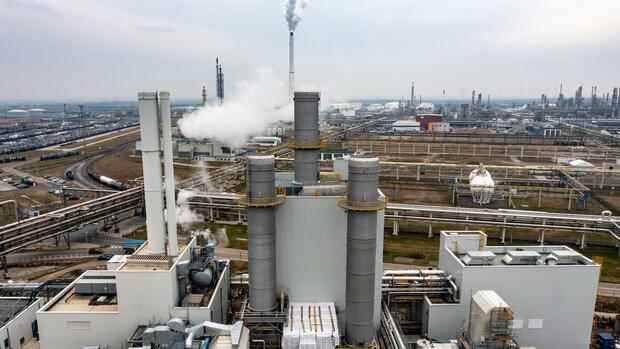Gas-fired power plants were originally intended to play an important role in the transition to climate-friendly power generation.
(Photo: dpa)
Berlin The Association of Industrial Energy and Power Industries (VIK) is convinced that gas-fired power plants should only be used in exceptional cases. “The use of natural gas to generate electricity must be reduced to the absolutely essential minimum,” said VIK Managing Director Christian Seyfert to the Handelsblatt. The association represents companies that together account for around 80 percent of energy use in industry.
Instead, Seyfert relies on the increased use of coal-fired power plants. In view of the dramatic upheavals on the energy markets, it is “not justifiable to stick to all the regulations intended to reduce the use of coal in power plants,” said Seyfert. For the duration of the crisis, for example, the decommissioning auctions for hard coal-fired power plants would have to be interrupted under the coal phase-out law, he demanded.
A draft resolution for the VIK board also states that the legally stipulated decommissioning dates for lignite-fired power plants in the years 2022 and 2023 must be postponed to the end of 2024. In addition, “taking into account the situation, which has meanwhile worsened, the intended decommissioning of the last nuclear power plants at the turn of the year should be critically examined again, since according to the plan they are to be replaced by natural gas power plants”. This alone “corresponds to a doubling of the current natural gas consumption of power plants without heat extraction”, i.e. of gas power plants that only supply electricity.
The demands of the VIK are further evidence that large parts of the economy are worried that they will no longer have enough gas available by next winter at the latest. It is therefore considered sensible in many places to use as little gas as possible today and thus conserve the reserves of the gas storage facilities.
Top jobs of the day
Find the best jobs now and
be notified by email.
The Federal Network Agency is currently conducting a survey among large gas consumers. The agency wants to determine the needs and at the same time get an idea of which companies are systemically important or would suffer particularly serious damage as a result of an interruption or reduction in the gas supply.
Klaus Müller, head of the Federal Network Agency, recently suggested introducing an additional auction system in the event of supply interruptions. Economists support such considerations.
Habeck advocates a pragmatic approach
Economics Minister Robert Habeck (Greens) spoke out in favor of a pragmatic approach to overcoming bottleneck situations at the beginning of March, i.e. a few days after Russia attacked Ukraine. He did not rule out that coal-fired power plants would have to run longer in order to become more independent from Russia in terms of energy policy, he had said. The ministry said on Thursday that it was currently examining “how additional electricity generation capacities – apart from gas – can be made available to the market, especially for the coming winter”. The aim is to save gas. “The exact design has not yet been determined.” A proposal will be presented. However, it is already clear that the tenders for the shutdown of hard coal-fired power plants will not be postponed because the upcoming tenders will only be for shutdowns in a few years.
From the point of view of the VIK, time is of the essence. There is “considerable potential” to reduce the use of gas-fired power plants. “Many weeks have already passed since the beginning of the war and the turning point in history, we must now leverage this potential immediately, and we need the federal government for that,” said Seyfert.
Storage in Rehden is slowly filling up
Meanwhile, there are signs of a slight relaxation in terms of gas reserves: According to the Federal Network Agency, Germany’s largest natural gas storage facility in Rehden is filling up easily. The gas storage facility is operated by the Astora company – a wholly owned subsidiary of Gazprom Germania, where the Netzagentur has been in charge as a trustee since April 4. As a result, the Russian state-owned company Gazprom has no way of objecting to the filling.
More: Floating LNG terminals should be ready in winter
